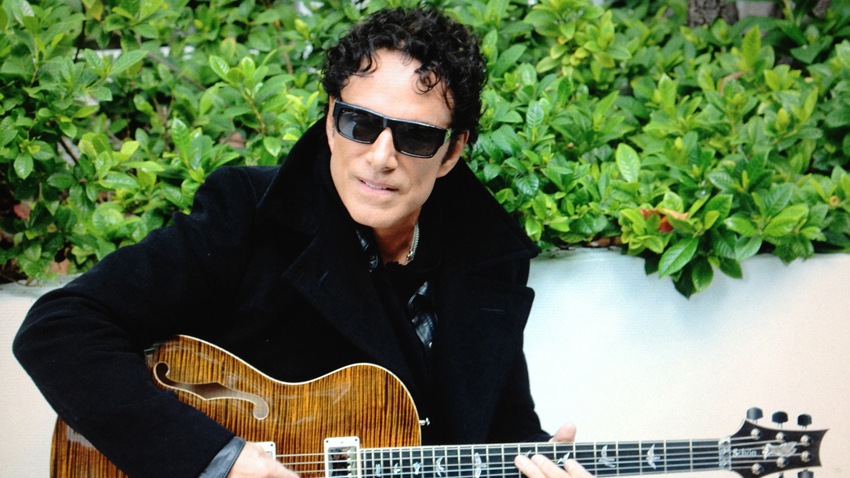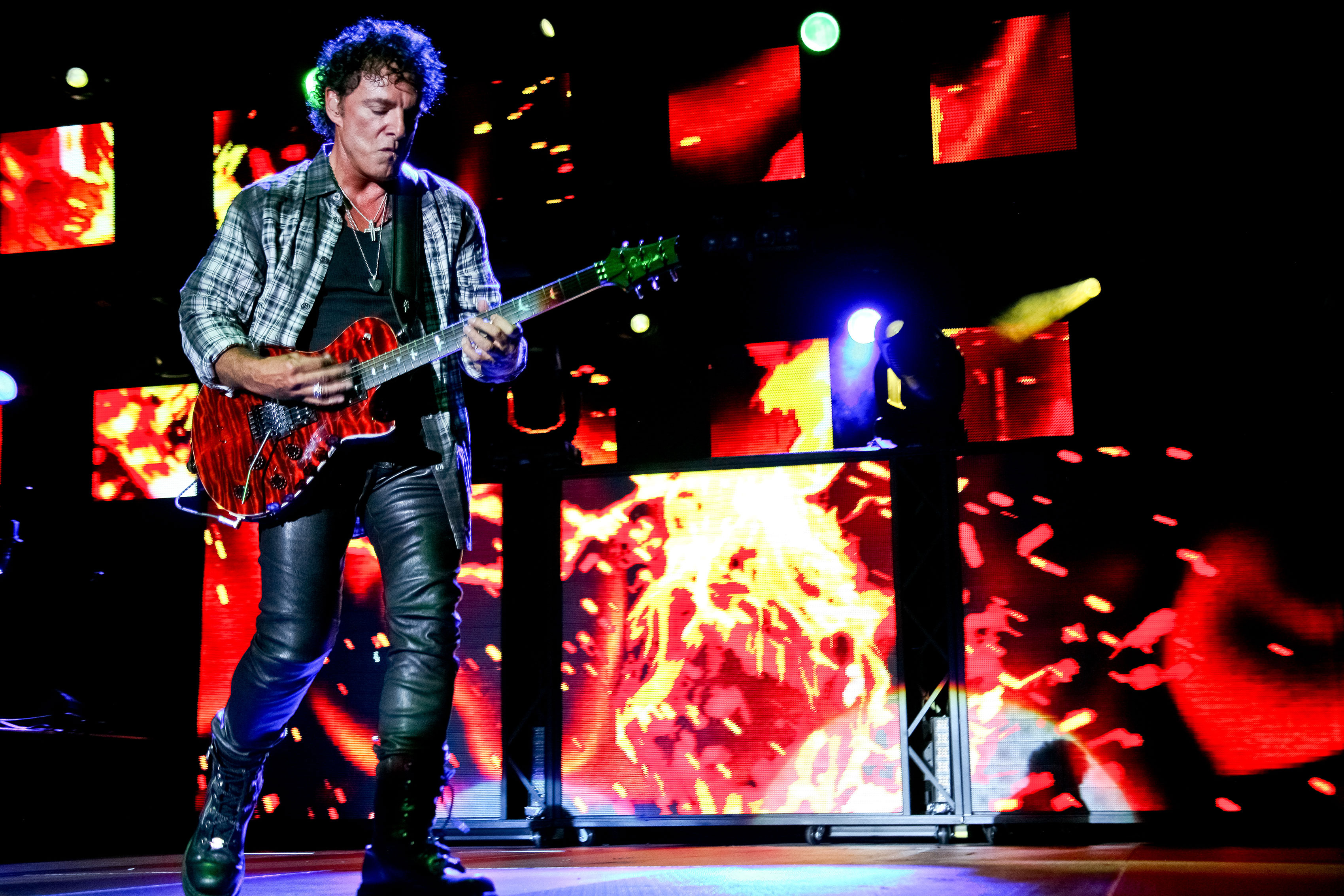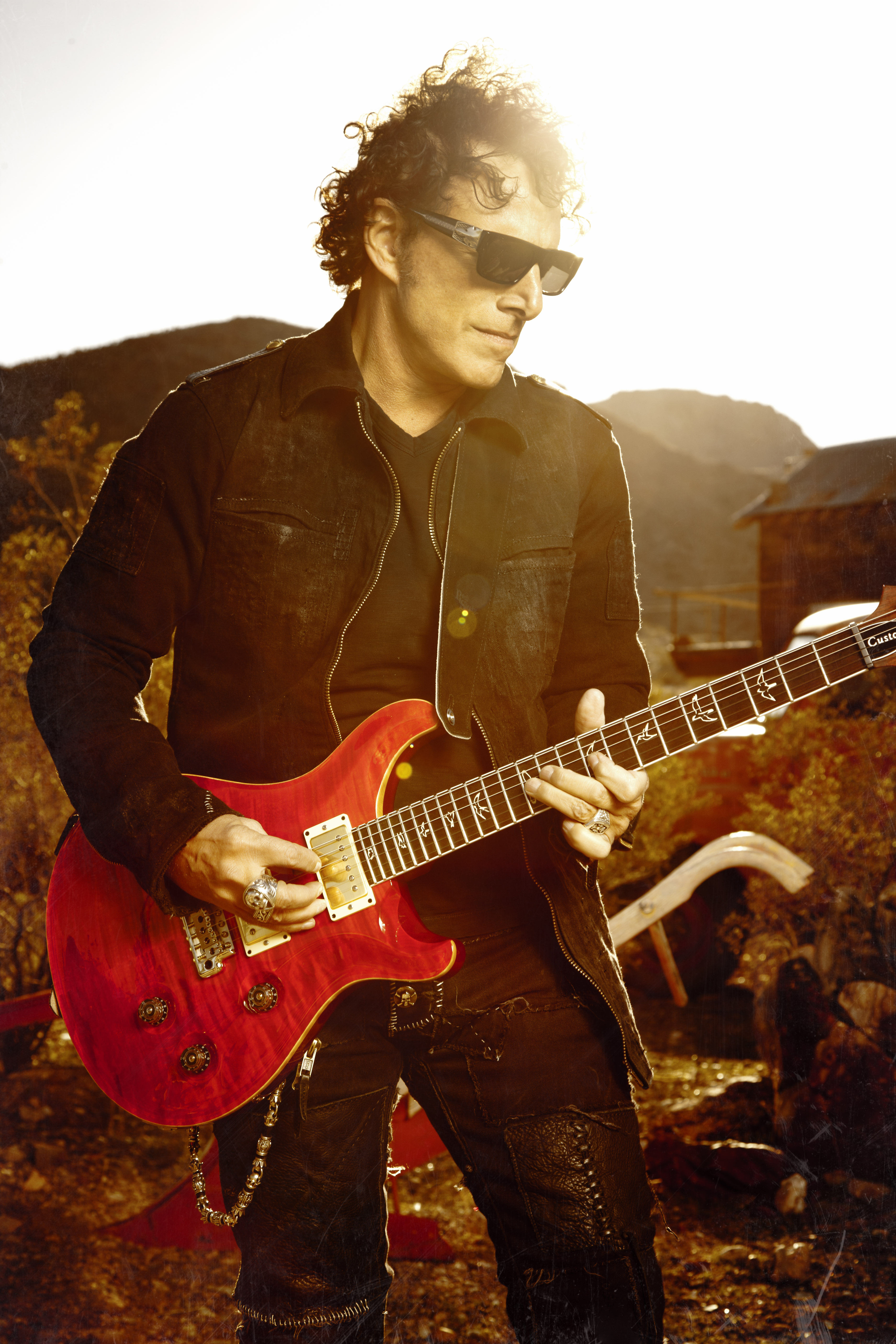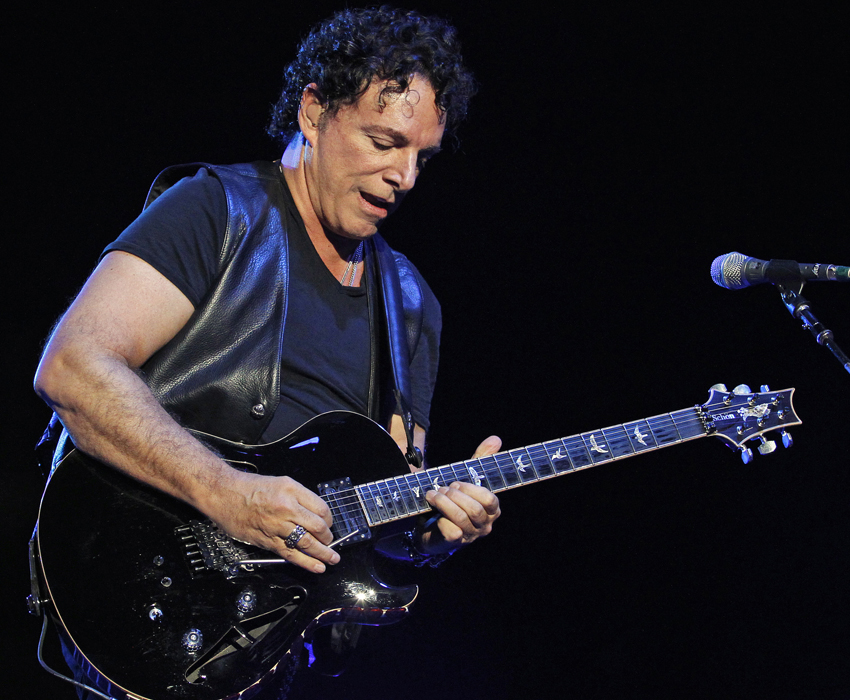
You'd think that a guy who joined Santana at the age of 15 (this after turning down an offer from Eric Clapton to be one of Dominos, as in Derek And The Dominos), and who's sold upwards of 80 million albums with Journey, could get a little jaded. But Neal Schon admits that he's enjoying the positive buzz surrounding his new solo album, The Calling.
"I'm getting a lot of great feedback," Schon says with a laugh. "And it really pretty cool, especially when you consider how I made this record. It was all done very spontaneously. I sort of winged it and didn't pre-plan it. I think that's why it sounds so fresh."
The 12 instrumentals that make up The Calling are a lively, deeply soulful blend of furious rock, funk, jazz and blues, which Schon cut with a tight group of musicians: keyboardist Igor Len, along with two noted players from his past, former Journey drummer Steve Smith, and keyboard wiz Jan Hammer.
Currently, Schon is in the midst of an extensive US tour with Journey, but he sat down recently to talk with MusicRadar about how the new album came together, what it was like working with drummer Smith after all these years and how the death of Ronnie James Dio influenced one of the new songs. Plus, he took the hot seat to answer a batch of your questions.
You didn't really have full demos when you started recording?
"I had a bunch of riffs on a looping machine. That's how I like to work - I get ideas and lay them down, but I don't really work out whole songs. I would go through the riffs and pick out the ones I really liked. Certain ones jumped out as being really strong."
How did you and Steve flesh out the riffs to turn them into full songs?
Get the MusicRadar Newsletter
Want all the hottest music and gear news, reviews, deals, features and more, direct to your inbox? Sign up here.
"We pretty much jammed on them. The two tracks that Steve co-wrote with me, he had little chord pads where he did the tablas and marimbas. After he played me that stuff, I jumped right in. He and I have always been like that - somebody will play something, and we just start creating.
"Then I had Igor in the other corner working on orchestrations. It worked out really well. Steve would loop his drums on a groove, and then I'd lay out the landscape with rhythm guitar. I took things from there. The new tunes evolved in a nice, organic way. I didn't have to overthink things."

"There's really nothing I don't like about guitars," says Schon, seen here on stage with Journey. © Marty Moffatt
You have such a history with Steve. What does he bring to your music that's different from other drummers?
"I've always really liked playing with jazz drummers, whether it's Steve Smith or Omar Hakim, and I like rock drummers, too. Deen Castronovo - he's a monster at what he does, and one of the best. Through the years, Steve has said that he keeps bettering himself as a drummer because he studies so many different styles. I remember years back he was studying Bonham. He would play for me, and he sounded exactly like John Bonham. He analyzed what John did and really broke it all down.
"So what I like is how musical Steve is when he plays - and thinks. He's a real 'outside-the-box' guy. He's not just all drum chops; he's musical, he's about feel. He's into making things groove. There's a slinkiness, and openness to his playing - and it's on the record, too. Between the guitar and the drums, there's a looseness, but it's tight. It's tight in that we didn't have songs when we walked in the studio, but when you hear the record, it's hard to believe that we didn't. It's complete."
Jan Hammer is another guy you've played with before.
"Well, I don't want to take anything away from Igor, who is on everything but two tracks. He's remarkable. I really dug the vibe of having acoustic piano or Rhoads piano - there's an earthiness that Igor brings to his playing. But after I listened to the song Tumbleweeds, there's a melody that I was playing on the guitar, and when I heard it I thought, That's Jan. That's his inspiration to me.
"So I sent him an MP3 and asked him if he'd play a couple of solos for me. It was funny - he didn't answer back right away. I was staring to wonder what was happening, but then he sent it back done a few days later with a note that said, 'I played some really cool, melodic stuff and some really ass-kickin' stuff here!' [Laughs] I love that. Jan is amazing. You know, you're only as good as the people you're playing with - always."
Speaking of playing with good people, you play bass on the album. How does Neal Schon the guitarist rate Neal Schon, bassist?
[Laughs] "I don't think I'm anything spectacular on the bass. I kind of went old school and did what I call 'tuba bass' on this, filling out the bottom, much like Noel Redding did when he played with Jimi Hendrix - or even when Jimi himself picked up the bass, like on Watchtower. I thought about using somebody really good, but I like the air that I got. It allowed the space to be there in a cool way.
"Listen to rap records and R&B records that are out there today - you hear a lot more foot than bass. Sometimes the bass comes and goes, but they tune the foot, the kick, to whatever note it is they want to hit. I liked that concept of Smith and I being able to create, and then I laid down the bass later."
You brought up Hendrix, which reminds me that you said you thought there was a Jimi vibe in the song True Emotion. Did that hit you later, or were you thinking Hendrix while recording?
"I'd be silly to say not. [Laughs] Even the chords in the background and the 6/8-type feel that Smith implied on the drums, it's all there from early Hendrix records. Jimi was a huge influence on my playing. There's no denying that. I think everybody would have to admit that, and if they didn't they'd be lying."
Blue Rainbow Sky is dedicated to Ronnie James Dio. What's the story there?
"It goes back to the '80s when I did the Hear'n Aid thing with him. Ronnie really wanted me to come down and play with all of these metal guitar players. I know I can play that style, but I was a little hesitant - I'd been out late partying, and I hadn't slept, and so I tried to back out of it. Ronnie was like, 'No. Neal, you need to come down here.'
"I did it. I grabbed my guitar and jumped on the next flight down to LA from San Francisco. Ronnie promised me he'd get me in and out so I could get back home and get some sleep. So I went down, and there was this line of guitar players all waiting their turns. Ronnie put me at the top of the line, right in front of Yngwie - he was turning up the heat a little [laughs]. I had a great conversation with Yngwie. It was my first time really talking to him; he was very cool. But it was taking hours - people were doing punches. Every four bars they'd punch a guitar solo. So I told Yngwie, 'I'm going to go in there, get a good sound, I'll play two solos and I'm out of here.' And that's what I did. I didn't think - I just played.
"I knew Ronnie ever since then, and I'd run into him every now and then. When I heard that he'd passed, I went outside - I live in Marin, and I get these beautiful sunsets - and on this particular night the sky was so blue, like there was an electric blue rainbow. From one side of my land to the other side, it was turquoise, electric blue, royal blue, light blue - it was a rainbow of blue. And I just said, 'That's Ronnie.'"
The Coral sitar in the song Fifty Six is a nice touch.
"Yeah, it sounds good. I'm not a really good sitar player, but the Coral sitar is like a guitar, and it's got the sympathetic strings. That's one of the songs where Steve Smith came up with a tabla part, and so I pulled out Coral. I tuned the sympathetic strings to the melody - it sounds more like a sitar than an electric sitar, which has a bit of a different sound."

If given the chance to go back in time and jam with Hendrix, Schon admits that he'd play "anything." © Travis Shinn
Let's segue to our reader questions. Sonny Mendez asks, What guitars and pickups are you using in the studio?
"On this album, I used three different Paul Reed Smiths that he made for me. One was a 22 fret singlecut, and it had an older-style PAF in the treble position. They were all set up with Fernandes Sustainers and DiMarzio Fast Track in the neck position. The other ones were 24 fret singlecuts, and they had Seymour Duncan Custom Customs in the bridge position. A couple of them had Roland GR synth pickups on them."
RT Guitar Man wants to know, If you could go back in time and jam with Hendrix, what song would you want to play?
[Laughs] "That's a good one. Man, you know, I'd love to play any song with him. When I joined Santana, we were three months away from cutting a record at Electric Lady, and there was talk that he was going to come in and jam with us. Then he passed, unfortunately. We went to that studio and cut a record with Eddie Kramer. It was eerie. I don't think we could get past the fact that Jimi wasn't there, so we packed up and went back to San Francisco to work at Columbia Studios.
"But to answer that question - I'd want to play anything with Jimi Hendrix, but if I had the chance, I'd love to actually work on something new with him. Creating a song with Jimi would be amazing."
Lenny H asks, Who is the last guitarist who made a strong impression on you?
"There's so many good guitarists. All the old guys who are from my era - Jimi, Jimmy Page, Jeff Beck, Clapton - and then the blues guys like Albert King, BB King, Buddy Guy, Stevie Ray… I love so many of them. Somebody new… I've always loved Lukather's work. And Mike Landau, he's an amazing player. It's mind-boggling how much feel and creativity he has."

On stage in West Palm Beach, Florida, 2012 © A. Patel/Corbis
Cal Griffin wants to know, What's the one thing you don't like about guitars? That they go out of tune? That you have to change strings? What annoys you about them?
[Laughs] "There's really nothing I don't like about guitars. I've played crappy ones and great ones, and to me, they're all great. I have the best tech in the world, Adam Day, but before I had a tech, I'd change all my strings myself - I never had a problem doing that. And even today, when I'm in the studio and if Adam isn't around, I'll still do that. It's fine. I love guitars, everything about them."
Scott Dehnman asks, What kind of practice routine do you have at home, and is there any special set of warm-ups you do on the guitar before a show?
"I just doodle a lot. I try to get my fingers agile and moving. I play a lot of fast stuff up and down the neck. Sometimes I play longer than others - I practice a lot on the bus. I don't do scales or anything like that; I'm not a real scale guy. But I will practice to a looping machine. I'll get a drum groove going, and then I'll just blow over it."
Rick Whalen asks, When was the last time you played on stage or in private with Carlos Santana? Do you think you two might ever work together again?
"Carlos and I talk all the time now. I've always loved his playing, and I've been listening to his new record a lot - it's fantastic. It's up to him, but I'd love to play with him any time. It'd be an honor.
"The last time I did play with him was in the '80s, maybe around '81 or '82. There was a Santana reunion in the Bay Area, and I got to play with him a lot that night. It was so great. I've always enjoyed playing with that band. The percussion is always something else to work with. The original guys in the band had a magical thing going on. So yeah, I'd play with Carlos any time."
Joe is a freelance journalist who has, over the past few decades, interviewed hundreds of guitarists for Guitar World, Guitar Player, MusicRadar and Classic Rock. He is also a former editor of Guitar World, contributing writer for Guitar Aficionado and VP of A&R for Island Records. He’s an enthusiastic guitarist, but he’s nowhere near the likes of the people he interviews. Surprisingly, his skills are more suited to the drums. If you need a drummer for your Beatles tribute band, look him up.










